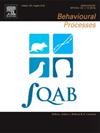紧急关系和竞争行为:对中断、准确性和反应时间的影响。
IF 1.3
4区 生物学
Q4 BEHAVIORAL SCIENCES
引用次数: 0
摘要
本研究调查了参与并行行为对未经训练的刺激-刺激关系产生的影响,特别是检查了测试中的中断、准确性和反应时间。六名参与者在三种条件下完成了一项计算机化的样本匹配任务:基线条件,假设与隐蔽语言行为不相容的唱歌条件,以及假设与隐蔽语言行为相容的跺脚条件。在唱歌和拍脚任务中,节奏保持一致。结果表明,与唱歌条件相比,踢踏舞条件下的平均中断次数更高。准确性和反应时间结果在被试之间存在差异,表明同时行为的影响存在个体差异。一些参与者在拍脚的情况下表现出准确性下降和反应时间增加,而另一些人在两种情况下都表现出一致的表现。这些发现强调了反应流畅性在并发任务执行中的潜在作用,以及言语中介对复杂行为的影响。这些见解对实验任务的设计和涉及复杂行为和并发任务的研究结果的解释具有启示意义。本文章由计算机程序翻译,如有差异,请以英文原文为准。
Emergent relations and competing behavior: Effects on interruptions, accuracy and reaction time
This study investigated the impact of engaging in concurrent behaviors on the emergence of untrained stimulus-stimulus relations, specifically examining interruptions, accuracy, and reaction times during test. Six participants completed a computerized matching-to-sample task under three conditions: a baseline condition, a singing condition hypothesized to be incompatible with covert verbal behavior, and a foot tapping condition hypothesized to be compatible with covert verbal behavior. The tempo was kept consistent across both singing and foot tapping tasks. Results indicated a higher average number of interruptions in the foot tapping condition compared to the singing condition. Accuracy and reaction time results varied between participants, indicating individual differences in the impact of the concurrent behaviors. Some participants showed decreased accuracy and increased reaction times during the foot tapping condition, while others demonstrated consistent performance across both conditions. These findings highlight the potential role of response fluency in the execution of concurrent tasks and the influence of verbal mediation on complex behaviors. These insights have implications for the design of experimental tasks and the interpretation of results in studies involving complex behavior and concurrent tasks.
求助全文
通过发布文献求助,成功后即可免费获取论文全文。
去求助
来源期刊

Behavioural Processes
生物-动物学
CiteScore
2.70
自引率
7.70%
发文量
144
审稿时长
4-8 weeks
期刊介绍:
Behavioural Processes is dedicated to the publication of high-quality original research on animal behaviour from any theoretical perspective. It welcomes contributions that consider animal behaviour from behavioural analytic, cognitive, ethological, ecological and evolutionary points of view. This list is not intended to be exhaustive, and papers that integrate theory and methodology across disciplines are particularly welcome.
 求助内容:
求助内容: 应助结果提醒方式:
应助结果提醒方式:


